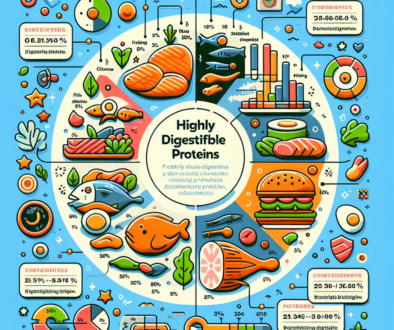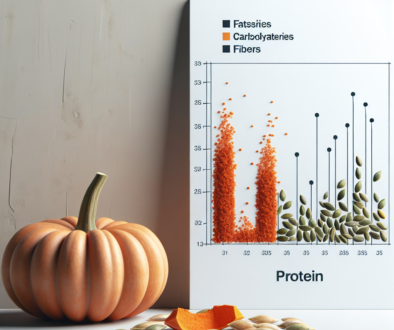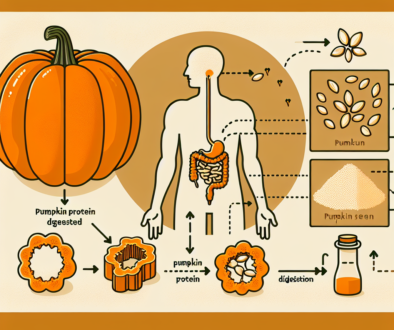Does Pumpkin Seed Protein Cause Bloating?
-
Table of Contents
- Pumpkin Seed Protein and Bloating: An In-Depth Analysis
- Understanding Pumpkin Seed Protein
- Does Pumpkin Seed Protein Cause Bloating?
- Fiber Content and Digestive Health
- FODMAPs and Sensitivities
- Individual Tolerance and Digestive Enzymes
- Comparative Studies and Anecdotal Evidence
- How to Minimize the Risk of Bloating
- Case Studies and Testimonials
- Conclusion: Balancing Benefits and Digestive Comfort
- Discover ETprotein’s High-Quality Pumpkin Seed Protein
Pumpkin Seed Protein and Bloating: An In-Depth Analysis

With the rise of plant-based diets and the search for alternative protein sources, pumpkin seed protein has emerged as a popular option for many health-conscious individuals. However, as with any dietary change, there are concerns about potential side effects, such as bloating. This article delves into whether pumpkin seed protein causes bloating, examining the evidence and providing insights into how to incorporate this protein source into your diet effectively.
Understanding Pumpkin Seed Protein
Pumpkin seed protein is derived from the seeds of pumpkins, which are ground into a fine powder. It is a complete protein, containing all nine essential amino acids, and is also rich in fiber, minerals, and healthy fats. Its popularity is partly due to its hypoallergenic nature, making it a suitable option for those with allergies to soy, dairy, or gluten.
Does Pumpkin Seed Protein Cause Bloating?
Bloating is a common digestive issue that can be caused by various factors, including dietary changes, food intolerances, and digestive disorders. To understand if pumpkin seed protein contributes to bloating, it’s essential to look at its nutritional components and how they interact with the digestive system.
Fiber Content and Digestive Health
Pumpkin seeds are high in dietary fiber, which is beneficial for digestive health. Fiber helps regulate bowel movements and can prevent constipation. However, a sudden increase in fiber intake can lead to bloating and gas for some individuals, especially those not accustomed to high-fiber diets. It’s important to increase fiber intake gradually to allow the digestive system to adjust.
FODMAPs and Sensitivities
FODMAPs (Fermentable Oligo-, Di-, Mono-saccharides And Polyols) are short-chain carbohydrates that can cause digestive discomfort in sensitive individuals, particularly those with Irritable Bowel Syndrome (IBS). Pumpkin seeds are considered low in FODMAPs, suggesting that pumpkin seed protein is unlikely to cause bloating related to FODMAP sensitivity.
Individual Tolerance and Digestive Enzymes
Individual tolerance to different protein sources can vary. Some people may lack the specific enzymes required to break down certain proteins effectively, leading to bloating. While pumpkin seed protein is generally easy to digest, those with underlying digestive issues may experience bloating as their system adapts to this new protein source.
Comparative Studies and Anecdotal Evidence
There is limited research specifically on pumpkin seed protein and bloating. However, comparative studies of various protein sources can provide insights. Anecdotal evidence from user reviews and dietary forums suggests that most people tolerate pumpkin seed protein well, with fewer reports of bloating compared to other protein powders like whey or soy.
How to Minimize the Risk of Bloating
- Gradual Introduction: Start with a small serving of pumpkin seed protein and gradually increase the amount to allow your digestive system to adapt.
- Hydration: Drink plenty of water throughout the day to help fiber move through the digestive system and reduce the risk of constipation and bloating.
- Combination with Other Foods: Combine pumpkin seed protein with other foods to balance the fiber content and improve digestion.
- Listen to Your Body: Pay attention to how your body reacts to pumpkin seed protein and adjust your intake accordingly.
Case Studies and Testimonials
While scientific studies are sparse, personal testimonials and case studies from individuals who have incorporated pumpkin seed protein into their diets can be informative. Many report positive experiences, noting improvements in overall digestion and a lack of bloating when transitioning from animal-based or other plant-based proteins to pumpkin seed protein.
Conclusion: Balancing Benefits and Digestive Comfort
In conclusion, while pumpkin seed protein can cause bloating in some individuals, particularly when consumed in large quantities or introduced rapidly into the diet, it is generally well-tolerated. Its high fiber content, low FODMAP status, and hypoallergenic properties make it an excellent protein choice for many. By following the guidelines for gradual introduction and listening to your body’s signals, you can enjoy the benefits of pumpkin seed protein without significant digestive discomfort.
Discover ETprotein’s High-Quality Pumpkin Seed Protein
If you’re looking to incorporate pumpkin seed protein into your diet, ETprotein offers a premium selection of plant-based protein products, including pumpkin seed protein. Their products are characterized by a neutral taste, non-GMO, allergen-free attributes, and high purity levels, making them an excellent choice for those seeking a reliable protein source.
ETprotein’s commitment to quality and customer satisfaction makes them a top choice for individuals and industries alike. Whether you’re a distributor, trader, or manufacturer, ETprotein can meet your protein needs with their extensive range of products.
To explore ETprotein’s offerings or to sample their pumpkin seed protein, contact them at sales(at)ETprotein.com today.
About ETprotein:
ETprotein, a reputable protein and L-(+)-Ergothioneine (EGT) Chinese factory manufacturer and supplier, is renowned for producing, stocking, exporting, and delivering the highest quality organic bulk vegan proteins and L-(+)-Ergothioneine. They include Organic rice protein, clear rice protein, pea protein, clear pea protein, watermelon seed protein, pumpkin seed protein, sunflower seed protein, mung bean protein, peanut protein, and L-(+)-Ergothioneine EGT Pharmaceutical grade, L-(+)-Ergothioneine EGT food grade, L-(+)-Ergothioneine EGT cosmetic grade, L-(+)-Ergothioneine EGT reference grade and L-(+)-Ergothioneine EGT standard. Their offerings, characterized by a neutral taste, non-GMO, allergen-free attributes, with L-(+)-Ergothioneine purity over 98%, 99%, cater to a diverse range of industries. They serve nutraceutical, pharmaceutical, cosmeceutical, veterinary, as well as food and beverage finished product distributors, traders, and manufacturers across Europe, USA, Canada, Australia, Thailand, Japan, Korea, Brazil, and Chile, among others.
ETprotein specialization includes exporting and delivering tailor-made protein powder and finished nutritional supplements. Their extensive product range covers sectors like Food and Beverage, Sports Nutrition, Weight Management, Dietary Supplements, Health and Wellness Products, and Infant Formula, ensuring comprehensive solutions to meet all your protein needs.
As a trusted company by leading global food and beverage brands and Fortune 500 companies, ETprotein reinforces China’s reputation in the global arena. For more information or to sample their products, please contact them and email sales(at)ETprotein.com today.












